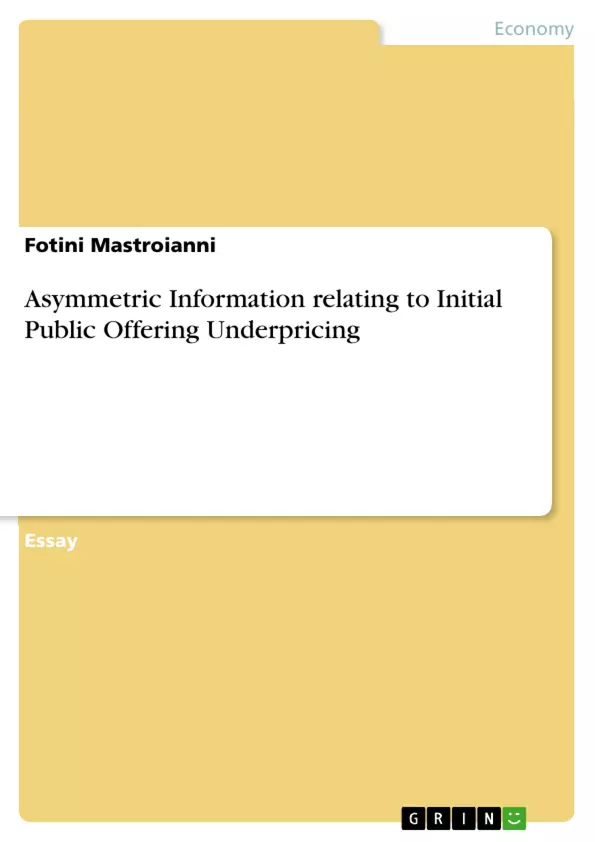The main reason why companies decide to proceed with IPO is mainly to gain access to new funding. The proceeds from the share issue itself are not necessarily intended for direct expansion. The prospects for growth from acquisitions, the funds available for organizational expansion and refinancing of current borrowings have shown, among other things, to be the main motives that newly listed companies consider as very important.
The general initial public offering procedure enhances the image and publicity of enterprises and gets not only an initial certification of the professionals in the financial markets but also a long-term price bidding (price signal) to suppliers, workforce and customers. According to Roell (1996), a robust equity value in the subsequent acquisition (during the trading of securities after their initial bid for public offering) reassures suppliers that they can safely grant trade credit, employees are convinced that they can expect a fairly stable job, and customers think that the products of the company will be supported as a result of their purchase (in the aftermath of their purchase).
Inhaltsverzeichnis (Table of Contents)
- Introduction - Initial Public Offering
- Assymetric information in general
- Theories of asymmetric information
- Information asymmetry among issuers and investors
- Information asymmetry among issuers and underwriters
- Information asymmetry among investors
- Assymetric information and Signalling Theory
- IPO Underpricing
- Causes of Initial Public Offering Underpricing
- Conditions of perfect information
- Delay of negotiation and stock market rise
- Underpricing as a hedge against legal risks
- Underpricing and oversubscription of the share
- Long-run underperformance of IPOS
- Research
- IPOS in US market 1985 - 1996 and Greek Market 2002-2006
- Other international research
- The reasons why IPO returns in the Internet sector are higher than other sectors
- Advices to Investors
- Conclusions
Zielsetzung und Themenschwerpunkte (Objectives and Key Themes)
This paper aims to explore the concept of asymmetric information in the context of initial public offerings (IPOs), particularly focusing on the phenomenon of IPO underpricing. The study delves into the theories and causes of asymmetric information, examining its impact on the relationship between issuers, underwriters, and investors.
- Asymmetric Information in IPOs
- IPO Underpricing Theories and Causes
- Signalling Theory and its Role in IPOs
- Empirical Research on IPO Underpricing
- Investor Advice and Strategies
Zusammenfassung der Kapitel (Chapter Summaries)
The introduction provides a detailed overview of the initial public offering (IPO) process, highlighting the significance of gaining access to new funding and the role of information asymmetry in this process. This chapter also introduces the concept of earnings management philosophy, which can be influenced by the need to maintain a high market price during the IPO period. The paper then delves into the concept of asymmetric information, explaining its various forms and the theories surrounding it. It discusses the 'adverse selection' and 'moral hazard' problems associated with asymmetric information, highlighting the importance of signaling and screening mechanisms to mitigate these issues. The paper further explores the concept of IPO underpricing, analyzing its causes, including conditions of perfect information, delay of negotiation, legal risks, and oversubscription. It also examines the potential for long-run underperformance of IPOs. The research section focuses on empirical studies conducted in the US and Greek markets, analyzing IPO returns and exploring reasons for higher returns in the Internet sector. Lastly, the paper concludes by providing advice to investors, emphasizing the importance of understanding the dynamics of asymmetric information and IPO underpricing.
Schlüsselwörter (Keywords)
This work centers around the key concepts of asymmetric information, initial public offering (IPO), IPO underpricing, signaling theory, earnings management, adverse selection, moral hazard, and investor strategies. The study analyzes empirical research findings from various markets, including the US and Greece, to understand the dynamics of IPOs and the role of asymmetric information in this process.
Frequently Asked Questions
What is an Initial Public Offering (IPO)?
An IPO is the process where a private company offers its shares to the public for the first time to raise capital and increase its visibility.
What is "IPO Underpricing"?
Underpricing occurs when the offer price of IPO shares is lower than the price at which the shares trade on the first day in the secondary market.
How does asymmetric information affect IPOs?
Asymmetric information exists when issuers, underwriters, or investors have different levels of information, leading to risks like adverse selection.
What is Signalling Theory in the context of IPOs?
Signalling Theory suggests that high-quality companies use specific actions, like underpricing, to signal their value to uninformed investors.
Why are Internet sector IPO returns often higher?
Research suggests that high growth expectations and higher levels of information asymmetry in the tech sector contribute to higher initial returns.
What is the "moral hazard" in an IPO?
Moral hazard occurs when one party takes risks because the costs are borne by others, often due to a lack of transparency between issuers and investors.
- Quote paper
- Fotini Mastroianni (Author), 2012, Asymmetric Information relating to Initial Public Offering Underpricing, Munich, GRIN Verlag, https://www.grin.com/document/359090



